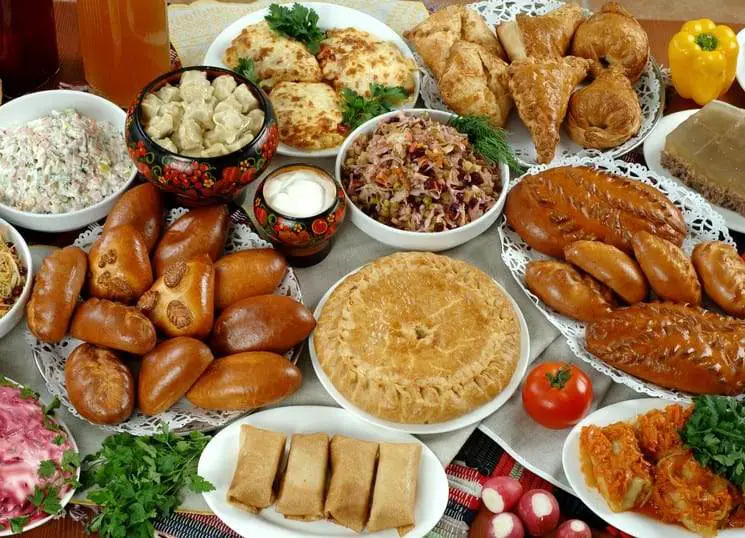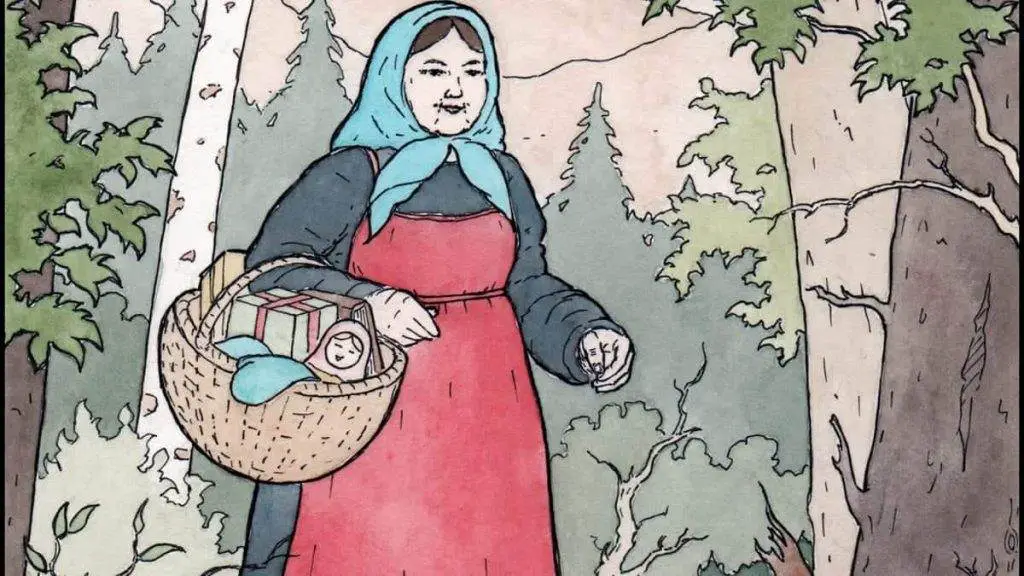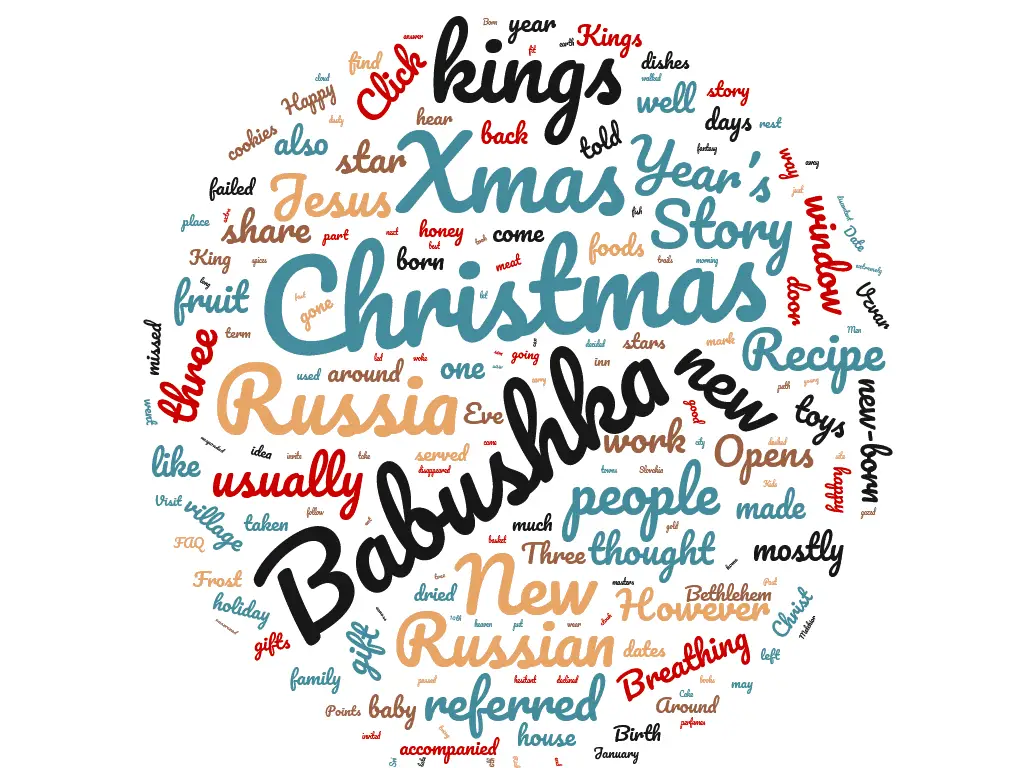Christmas was not recognized as much back in the days of the Soviet Union. Instead, the New Year’s celebration was deemed to be essential.
After the revolution in 1917, the religious holiday of Christmas was forbidden, and Christmas trees were prohibited up to the year of 1935 when New Year’s Trees replaced them!
If someone wanted to celebrate the Christmas holiday, they would have to do it in hideouts with their families, and it had to be highly secretive.
The collapse of the Soviet Union in 1991 rendered the people free from secretive Christmas celebrations.
However, Christmas in Russia is a more minor and quieter holiday, and it is done after the massive New Year’s parties.
Christmas Date in Russia
Russian Christmas is celebrated on the 7th of January. However, only a few of the Catholics might do their celebrations, on the 25th of December.
There is a difference in the date mainly because the Russian Orthodox Church incorporates the use of the ancient Julian’ dates to mark their religious celebrations.
Additionally, the Russian Orthodox Church celebrates the Advent.
However, it has fixed dates, which commence on the 28th of November and go all the way up to the 6th of January, rounding up to a total of 40 days.
The dates in Russia mark the authorized New Year’s and Christmas holidays to be from the 31st of December to the 10th of July.
People are then expected to resume their official duties of work and school afterward.
Merry or Happy Christmas in Russian is referred to as ‘s-schah-st-lee-vah-vah rah-zh dee-st-vah’ (Счастливого рождества!) or ‘rah-zh-dee-stvohm’ (C рождеством!).
Check our page to know how Happy or Merry Christmas is spoken in different languages.
Christmas Food in Russia
Some religious individuals do not indulge in any drinking or eating (fast) on Christmas Eve, up until the appearance of the first star in the sky.
Individuals then eat ‘kutia’ or ‘sochivo’ which is a porridge that is made out of rice or wheat and accompanied with fruit (mostly dried fruit like raisins as well as berries), honey, chopped walnuts, poppy seeds and sometimes fruit jellies are included.
Sochivo is taken from one common plate as a sign of unity.
In the past, some people would throw a spoonful of it into the ceiling, and if it stuck, it meant they would experience good harvests and good luck.

The Russian term for Christmas Eve is Sochelnik and is derived from the name ‘sochiv’.
A part of the Orthodox Christians in Russia do not partake any fish or meat on the eve of Christmas.
Some of the other significant foods taken on the Eve of Christmas include, vegan potluck referred to as ‘solyanka’ or beetroot soup referred to as ‘borsch’ and is accompanied with specific vegetable pies which are made out of mushroom, potato or cabbage (‘sauerkraut’).
Other foods include porridge-dish foods like buckwheat with fried mushrooms and fried onions, salads which are mostly made out of vegetables like tomatoes, mushrooms, gherkins as well as potatoes and other vegetables derived from plant roots.
There are 12 dishes during the meals to characterize the 12 followers of Jesus Christ. A boil-up, which is referred to as ‘Vzvar’, is mostly served after the end of the dining.’
Vzvar’ is a sweet drink that is served from honey and dried fruit boiled in water.
‘Vzvar’ is customarily served during the birth of a child; thus, it symbolizes the Birth of Jesus Christ when it is taken during Christmas.
Prayers are said after the meal, and the people may choose to go to the midnight Christmas church services.
Most people do not cleanse their dishes up until they return from Church, which sometimes can be until 4:00 am, or even 5:00 am.
The main Christmas meal is more of a feast as major delicacies are prepared.
Some of the typical dishes on the day of Christmas include goose, roast pork, as well as ‘Pelmeni’ and ‘Pirog’, which are meat dumplings.
The Dessert is mostly inclusive of gingerbread, fruit cakes, honey bread cookies, which are referred to as ‘Pryaniki’ and dried and fresh fruit and many nuts.
A part of the unique Russian foods is Christmas cookies, which are referred to as ‘Kozulya’ and are made to be in the shape of a deer, sheep, or goat.
Other Christmas Practices
Children may go around singing carols and visit the homes of family and friends and to wish all the people they meet a happy new year. They are gifted with sweets, cookies, or money in return.
The most outstanding thing about Christmas in Russia that is recognized by Westerners in the USA and Europe is the eventful story of Babushka.
Babushka is a term for Grandmother in the Russian language.
The story of Babushka narrates the event where an old woman met with the wise men on their way to visit the baby Jesus.
Nevertheless, a majority of people in Russia claim that they have never acclaimed such a story, and it was possibly made up by an American writer and poet (Edith Matilda Thomas), in the year of 1907.
Most Russian people claim that they have never heard of such a narrative before.
The Story of Babushka
There once lived a woman referred to as Babushka in a small Russian town. She mostly loved to do work involved with cleaning, polishing, sweeping as well as dusting.
Thus, her house was well kept and was the tidiest in the entire village. She also had an attractive garden, and her cooking was excellent.
In one of the evenings, she was busy cleaning and dusting to the extent that she could not hear all of the villagers shouting and talking at the village square as they were astounded by the new trail of stars in the sky.

Even though she had heard about the new star, she thought of the gathering as a fuss and did not have time to look at the stars because she was late in her work and had to finish it that night.
Therefore, Babushka missed the brightly shining star that shone so high overhead. She additionally failed to witness the blissful line of twinkling brightness that descended the village at dawn.
She missed the sounds of the drums and pipes by the amused villages.
She failed to hear the whispers and voices of the villagers who were surprised and caught in the dilemma of whether the lights were some kind of procession or an army.
The Visit by the Three Kings
She failed to hear the sudden silence of the villagers and also the footsteps that headed towards her door. However, the one thing that she could not miss was a loud knock on her door.
She was astonished by the knock, and when she opened the door, Babushka stood mouth agape.
There stood three kings in front of her door with one of their helpers.
The servant requested for Babushka to let the kings rest at her place, as her house was the best in that particular village. Babushka was not hesitant and welcomed them into her home.
The masters were extremely happy when they saw all the freshly-baked cakes, bread, and pies. Babushka dashed around while serving them and asking them where they had come from.
Caspar answered that they had come from a very long way; Melchior responded that they were following the new star, and Balthasar said that they did not know where they were going, but they thought the stars led to a new-born king of both heaven and earth.
Balthasar asked Babushka if she would come with them and bring with her gifts just like they did. The three kings were taking to the new-born gifts like gold, perfumes, and spices.
Babushka wondered if she would be welcomed, and also the kind of gift that she would take with her. She thought of the many toys in her cupboard.
She explained that the toys were around because her son died when young. Balthasar told her that the born King would be her King, too, and invited her to come with them.
Babushka cleaned up while the kings slept and thought of it as extra work. She also thought that the idea of going with the kings to find the new-born was a funny one.
She thought of the idea as a fantasy, and that she had too much tidying up to be done.
She also wondered what she would wear, the gift she would carry, and the person that would clean the house while she was away.
Babushka’s Decline of Invitation
Babushka declined Balthasar’s invite and told him that she would follow them the next day because she had too much work to do, and she had to find a gift.
The three kings left discontent with her answer, and she went back to the house to continue with her work.
She walked up to the toys cupboard and gazed at all the dusty toys which were not fit for a new-born king. She cleaned them up until morning when the star had disappeared.
Babushka decided to rest, and she woke when it was already at night. She took her cloak, put the toys in a basket, and followed the path that the kings had followed.
Babushka Follows the Three Kings
She asked the people on the trails of the three kings and followed them. She passed through villages, towns and came across a palace in the city.
However, the new-born King was not in the royal palace.
When she was told that the three kings had gone to Bethlehem, Babushka was so amused, since Bethlehem was a place of the poor and a royal baby would not be born there.
She followed the kings to Bethlehem and reached there in the evening. Babushka went to an inn to inquire about the three kings’ whereabouts.
The owner of the inn replied that the kings had been around for two days.
When Babushka was told that the kings and the baby’s family had already left some days before, she was very sad and started crying.
She was shown the stable where the baby was born and that it was Jesus, the world’s savior that had been born.
However, the family had gone to Egypt for safety, and the three kings had gone back to their countries.
Babushka became very sorrowful that she had missed seeing the baby, Jesus. It is supposed that she is still searching for him.
Recognition of New Year’s Celebrations
New Year in Russia is highly recognized and people extensively spend their cash on food and drinks. On the other hand, Christmas is more private and religious.
The New Year celebrations are accompanied by the appearance of the ‘Grandfather Frost’ (called ‘Ded Moroz’ in Russia), who gives gifts to children.
The ‘Grand Frost’ is escorted by his granddaughter, who is referred to as ‘Snegurochka’. You will find children holding hands and calling ‘Ded Moroz’ or ‘Snegurochka’ on New Year’s Eve.
Once the two appear, the lights and the star on the New Year’s tree are lit. The ‘Grand Frost’ carries with him a large magic staff.
The native greeting for a happy new year in Russian is ‘Snobym Godom’.
Learn More With the Help of Video
Main Points About Christmas in Russia
- It is very common for the Russians to observe two Christmases. One, on the 25th of December, and the second on the 7th of January.
- Christmas celebration is popular at all in Russia and it is widely celebrated on the 7th of January.
- Traditionally, on Christmas eve (Holy Super), 12 dishes are prepared to honor each of the 12 disciples.
- The Christmas meal eaten on Christmas eve concludes the nativity fast (28th November to January 6th). It is devoid of meat and purely vegetarian.
- Christmas in Russia is a religious affair as well as a time set aside for family bonding.
Conclusion
Christmas was banned as a religious holiday from 1929- 1991 and people had to celebrate in secret if they wanted to celebrate, so Christmas trees turned into New Year’s trees during this time.
Since 1991 people are free to celebrate Christmas again though, but it’s still a much more still time than New Year’s, which is also when ”Grandfather Frost” will give presents to children.
Russia uses the Orthodox Julian Calendar, celebrating Christmas on January 7th.
Word Cloud for Christmas in Russia
The following is a collection of the most used terms in this article on Christmas in Russia. This should help in recalling related terms as used in this article at a later stage for you.

- https://en.wikipedia.org/wiki/Christmas_in_Russia
- https://www.tripsavvy.com/russia-christmas-traditions-1502306
- https://traveltriangle.com/blog/christmas-in-russia/

The unique Christmas foods in Russia sound absolutely delicious. I’m intrigued by the 12 dishes to characterize the 12 followers of Jesus Christ.
The article provides a comprehensive and educational overview of Christmas traditions in Russia. Well done!
The tradition of Christmas food in Russia is captivating. The significance and symbolism are truly fascinating.
I disagree with the prohibition of Christmas celebrations in the past. It’s a violation of religious freedom.
Ironic that Christmas cookies are made in the shape of animals. Quite different from other traditions!
The part about children singing carols and visiting the homes of family is heartwarming. Christmas is truly a special time.
The journey from secretive Christmas celebrations to the festive tradition today is quite enlightening.
I find it intriguing that the Christmas date in Russia is different due to the use of ancient Julian dates.
Such an interesting insight into the history of Christmas celebrations in Russia! Impressive article!
It’s fascinating to learn about how Christmas was celebrated in Russia during the Soviet Union.